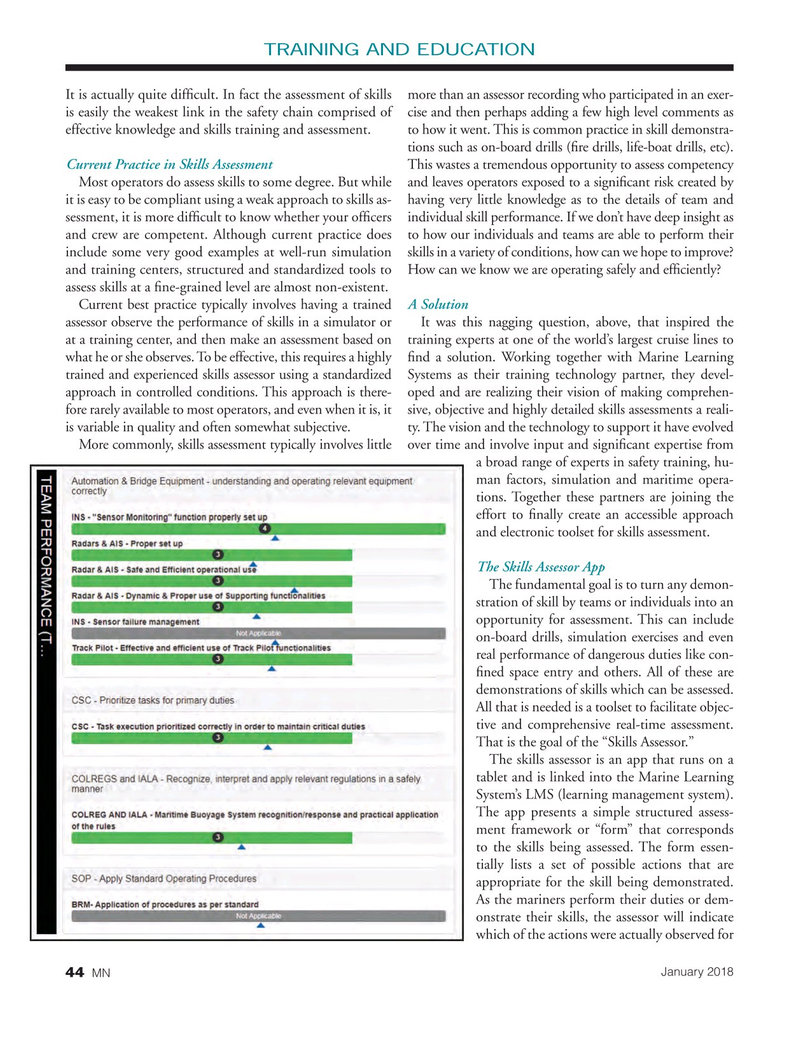
Page 44: of Marine News Magazine (January 2018)
Passenger Vessels & Ferries
Read this page in Pdf, Flash or Html5 edition of January 2018 Marine News Magazine
TRAINING AND EDUCATION
It is actually quite dif? cult. In fact the assessment of skills more than an assessor recording who participated in an exer- is easily the weakest link in the safety chain comprised of cise and then perhaps adding a few high level comments as effective knowledge and skills training and assessment. to how it went. This is common practice in skill demonstra- tions such as on-board drills (? re drills, life-boat drills, etc).
Current Practice in Skills Assessment This wastes a tremendous opportunity to assess competency
Most operators do assess skills to some degree. But while and leaves operators exposed to a signi? cant risk created by it is easy to be compliant using a weak approach to skills as- having very little knowledge as to the details of team and sessment, it is more dif? cult to know whether your of? cers individual skill performance. If we don’t have deep insight as and crew are competent. Although current practice does to how our individuals and teams are able to perform their include some very good examples at well-run simulation skills in a variety of conditions, how can we hope to improve? and training centers, structured and standardized tools to How can we know we are operating safely and ef? ciently?
assess skills at a ? ne-grained level are almost non-existent.
Current best practice typically involves having a trained A Solution assessor observe the performance of skills in a simulator or It was this nagging question, above, that inspired the at a training center, and then make an assessment based on training experts at one of the world’s largest cruise lines to what he or she observes. To be effective, this requires a highly ? nd a solution. Working together with Marine Learning trained and experienced skills assessor using a standardized Systems as their training technology partner, they devel- approach in controlled conditions. This approach is there- oped and are realizing their vision of making comprehen- fore rarely available to most operators, and even when it is, it sive, objective and highly detailed skills assessments a reali- is variable in quality and often somewhat subjective. ty. The vision and the technology to support it have evolved
More commonly, skills assessment typically involves little over time and involve input and signi? cant expertise from a broad range of experts in safety training, hu- man factors, simulation and maritime opera- tions. Together these partners are joining the effort to ? nally create an accessible approach and electronic toolset for skills assessment.
The Skills Assessor App
The fundamental goal is to turn any demon- stration of skill by teams or individuals into an opportunity for assessment. This can include on-board drills, simulation exercises and even real performance of dangerous duties like con- ? ned space entry and others. All of these are demonstrations of skills which can be assessed.
All that is needed is a toolset to facilitate objec- tive and comprehensive real-time assessment.
That is the goal of the “Skills Assessor.”
The skills assessor is an app that runs on a tablet and is linked into the Marine Learning
System’s LMS (learning management system).
The app presents a simple structured assess- ment framework or “form” that corresponds to the skills being assessed. The form essen- tially lists a set of possible actions that are appropriate for the skill being demonstrated.
As the mariners perform their duties or dem- onstrate their skills, the assessor will indicate which of the actions were actually observed for
January 2018
MN 44

 43
43

 45
45
